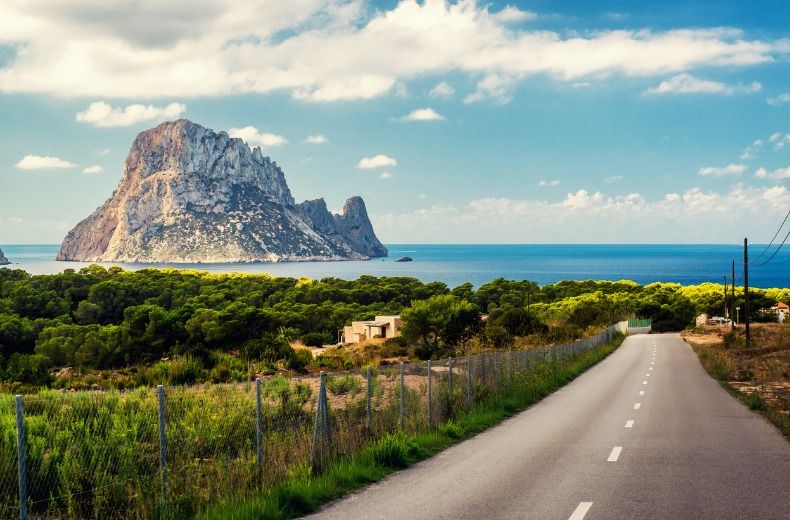Here, we translate common and not so common road signs, so you’re not left bamboozled in Basque country or befuddled in the Balearics.
For more advice on exploring the country by car including what to do in the event of a breakdown read our Driving in Spain guide.
‘Speed limit’ signs
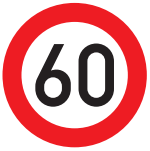
A red oval road sign with numbers is used in Spain to indicate the speed limit. Although the circular signs are identical to those used in the UK, you’ll need to pay special attention to the numbers given. For example, 120 kph (the maximum speed limit on Spanish motorways) works out at 74 mph.
Spain uses kilometres per hour (km/h) rather than miles per hour (mph) on all of its road signs. Make sure you don't confuse the two, otherwise you'll end up having a very difficult conversation with the local police.
‘Minimum speed limit’ sign
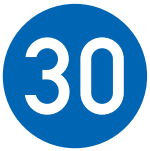
If you see a white number on a blue circle road side in Spain then it will indicate the minimum speed limit for the road you are driving on. If your car isn’t capable of driving at the speed indicated on a given road, you’ll need to find another route.
‘Recommended speed applies’ and ‘recommended speed ends’ sign
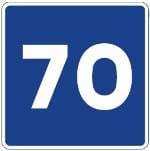
A blue square with a number in the middle displays a maximum recommended, or maximum safe speed, to travel on a stretch of road in Spain.
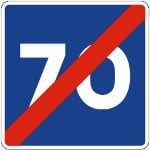
If you see a blue square with a number with a red diagonal line, then the maximum recommended speed no longer applies. Although you may be tempted to increase your speed at this point, it’s important to remember and stick to the speed limit.
‘Give way’ sign
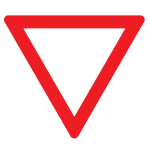
Spanish ‘give way’ road signs are very similar to those used in the UK with one key difference, they don’t feature any text. When you see a red triangle pointed downward with a white centre, be prepared to give way to any oncoming and crossing traffic. The sign should appear next to markings on the road to show you where to stop.
‘Stop’ sign
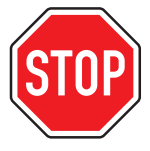
There’s no mistaking a Spanish stop sign. The red octagon features white text with the English word ‘STOP’ in capitals.
You’ll see the sign next to road markings showing you where you should give way to traffic.
‘Roundabout ahead’ sign
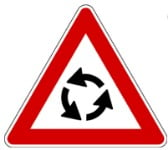
Roundabout signs in Spain features a triangle with a red border and circular arrows. They are almost identical to UK roundabout signs bar one small detail - the arrows point counter-clockwise rather than clockwise. Why? Because traffic moves on the right-hand side of the road in Spain.
As soon as you see this sign, you should check for vehicles approaching from the left to let them pass.

Instant cover available
• 24/7 rescue at the roadside
• Help to get home if your vehicle can't be fixed
• 5 star Defaqto rated cover
*T&Cs apply.

‘Cars not allowed’ sign
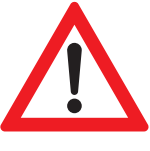
A road sign in Spain with an exclamation mark inside a triangle means that cars aren’t allowed. The sign might warn you about dangers in the road ahead in the UK but it’s a little more serious in Spain.
If you come across the sign, make sure you find an alternative route to avoid breaking local traffic laws.
‘Warning for accidents’ sign
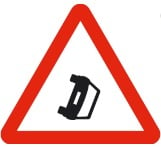
A road sign in Spain with a triangle and the image of a toppled car inside is placed near accident hotspots to remind drivers to pay extra attention to their speed and the layout of the road. If you spot on of these on your travels then drive with caution.
‘Uncontrolled crossroad’ sign
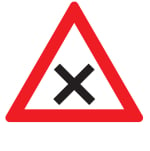
A black cross inside a red triangle is used to warn drivers in Spain that the junction ahead doesn’t use lights or some of the road markings you might expect to control traffic.
When you arrive at these crossroads it’s important to give way to vehicles approaching from the right.
‘No parking’ and ‘No stopping’ signs
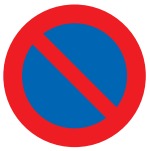
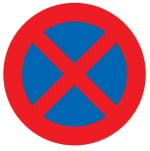
No parking signs in Spain use one diagonal red line while no stopping signs use two diagonal red lines. Roads with no stopping signs are more restrictive than roads with no parking signs, because you can’t bring your car to a stop on them, at all.
The circles might appear in a bigger rectangle to show a ‘no parking’ or ‘no stopping’ zone. Here rules apply on several roads until you see an ‘end of zone’ sign. These feature a black diagonal line over the top of the no parking or no stopping circle.
‘Priority road starts’ sign
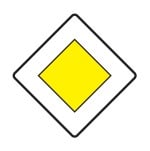
A yellow diamond with a white border indicates the start of a priority road in Spain. If you’re travelling on this road, you’ll have right of way over oncoming and crossing traffic.
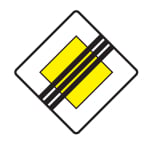
The ‘End of priority road’ sign uses the same yellow diamond with a white border but features a black diagonal line over the top.
‘Road bends ahead’ sign
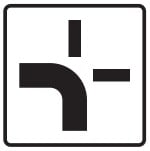
The 'road bends ahead' sign in Spain features a thick line that represents the main road you’re travelling on, while the thinner lines represent smaller roads. Although smaller roads may appear straight ahead, you’ll need to use your indicators to enter them and leave the main road.
‘Customs’, ‘Police roadblock’ and ‘Toll’ signs
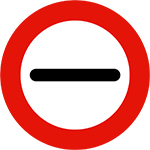
A red circle road sign with a black horizontal line is used by customs officers, the police and before toll booths.
Sometimes you’ll see the words ‘PEAJE’, ‘PEAXE’ or ‘PEATGE’ on the sign meaning tolls, ‘ADUANA’ meaning customs and ‘POLICIA’, unsurprisingly for police.
The sign will often appear before a barrier where you’ll need to stop your car and wait for further instructions.
‘Railroad crossing with one or more railway’ sign
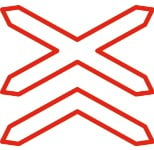
A cross with a half-cross or chevron shape below is used to tell drivers that the road ahead will intersect with more than one railway.
If you see this sign in Spain, you should look out for any barriers or traffic lights instructing you to stop your car.

Instant cover available
• 24/7 rescue at the roadside
• Help to get home if your vehicle can't be fixed
• 5 Star Defaqto rated cover
*T&Cs apply.


